
The 1852 United States presidential election was the 17th quadrennial presidential election, held on Tuesday, November 2, 1852. Democrat Franklin Pierce defeated Whig nominee General Winfield Scott. A third party candidate from the Free Soil party, John P. Hale, also ran and came in third place, but got no electoral votes.

The 1983 United Kingdom general election was held on Thursday 9 June 1983. It gave the Conservative Party under the leadership of Margaret Thatcher the most decisive election victory since that of the Labour Party in 1945, with a majority of 144 seats and the first of two consecutive landslide victories.
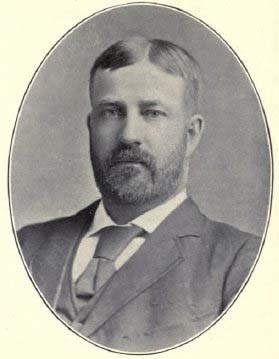
Sir Rodmond Palen Roblin was a businessman and politician in Manitoba, Canada.

Henry Moor was a British lawyer and politician who served as the second Mayor of Melbourne, Australia and as Member of Parliament for Brighton in England.
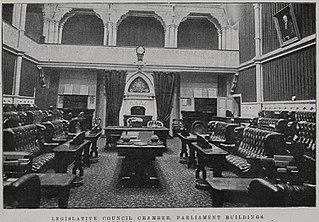
The New Zealand Legislative Council was the upper house of the General Assembly of New Zealand between 1853 and 1951. An earlier arrangement of legislative councils for the colony and provinces existed from 1841 when New Zealand became a colony; it was reconstituted as the upper house of a bicameral legislature when New Zealand became self-governing in 1852, which came into effect in the following year.

The 1997 Alberta general election was held on March 11, 1997, to elect members of the Legislative Assembly of Alberta.

José Trinidad Cabañas Fiallos was a liberal Honduran military general and politician who served as President of Honduras on two separate occasions: From 1 March to 6 July 1852. And 31 December 1853 to 6 June 1855. His role in Honduran history began during the First Central American Civil War. He became a Central America hero, when he attempted to reunite Central America, during Francisco Morazán's tenure and after the unionist's death.

Worcester is a borough constituency represented in the House of Commons of the Parliament of the United Kingdom. Since 1885 it has elected one Member of Parliament (MP) by the first past the post system of election; from 1295 to 1885 it elected two MPs.
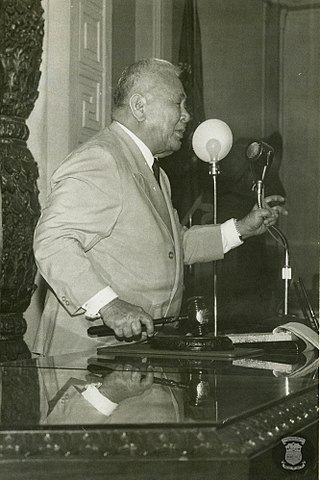
Elections for the members of the Senate were held on November 10, 1953 in the Philippines. Incumbent President Elpidio Quirino of the Liberal Party lost his opportunity to get a second full term as President of the Philippines to former Defense Secretary Ramon Magsaysay of the Nacionalista Party. Quirino's running mate, Senator Jose Yulo lost to Senator Carlos P. Garcia. Vice President Fernando Lopez did not run for re-election and ran for the Senate instead, in which he emerged as the candidate with the most votes. This was the first time that an elected president did not come from the Senate. To further compound the Liberal Party's woes, they also failed to win any seats in the Senate in this election.
Wairau was a parliamentary electorate in the Marlborough Region of New Zealand. It was one of the initial 24 New Zealand electorates and existed from 1853 until its abolition in 1938, when it was succeeded by the Marlborough electorate. The electorate had 13 representatives during its existence. The 1861 election in the Wairau electorate was notable in that a later Premier, Frederick Weld, was unexpectedly and narrowly defeated by William Henry Eyes.
Marsden was a former parliamentary electorate, in the Whangarei District and in the Northland Region of New Zealand, which existed from 1858 to 1972. Upon its abolition, Marsden was replaced with the Whangarei electorate.
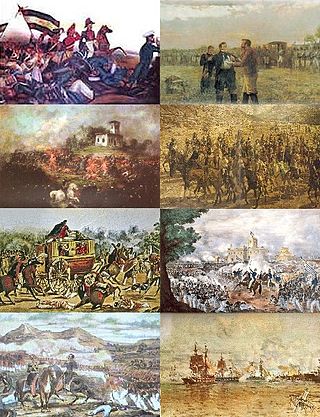
The Argentine Civil Wars were a series of civil conflicts of varying intensity that took place through the territories of Argentina from 1814 to 1853. Beginning concurrently with the Argentine War of Independence (1810–1818), the conflict prevented the formation of a stable governing body until the signing of the Argentine Constitution of 1853, followed by low-frequency skirmishes that ended with the Federalization of Buenos Aires. The period saw heavy intervention from the Brazilian Empire that fought against state and provinces in multiple wars. Breakaway nations, former territories of the viceroyalty, such as the Banda Oriental, Paraguay and the Upper Peru were involved to varying degrees. Foreign powers such as the British and French empires put heavy pressure on the fledgling nations at times of international war.
Christchurch was a parliamentary electorate in Christchurch, New Zealand. It existed three times. Originally it was the Town of Christchurch from 1853 to 1860. From the 1860–1861 election to the 1871 election, it existed as City of Christchurch. It then existed from the 1875–1876 election until the 1881 election. The last period was from the 1890 election to the 1905 election. Since the 1946 election, a similarly named electorate called Christchurch Central has been in existence.
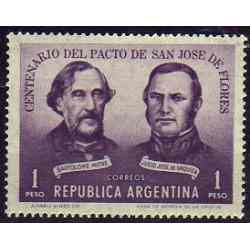
The Pact of San José de Flores was a treaty signed between the Argentine Confederation and the State of Buenos Aires on November 11, 1859, on the aftermath of the Battle of Cepeda. It established guidelines for the entry of the latter into the Confederation, and Buenos Aires' acceptance of the Argentine Constitution of 1853.

Partial general elections were held in Belgium on 8 June 1852. In the elections for the Chamber of Representatives the result was a victory for the Liberal Party, who won 57 of the 108 seats. Voter turnout was 69.2%, although only 42,053 people were eligible to vote.
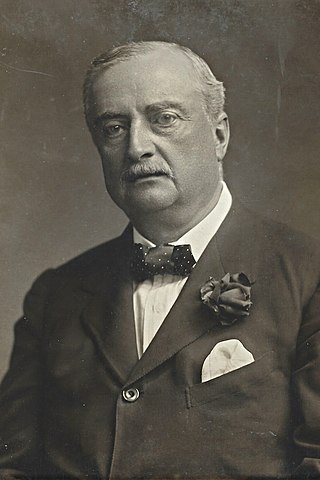
The Irish component of the December 1910 United Kingdom general election took place between 3 and 19 December, concurrently with the polls in Great Britain. Though the national result was a deadlock between the Conservatives and the Liberals, the result in Ireland was, as was the trend by now, a large victory for the Irish Parliamentary Party. The IPP supported the Liberals to form a government after the election. This was to be the party's last victory, however. Due to the outbreak of World War I in 1914, the next general election would not be held until 1918, by which time events both in Ireland and Britain and outside would conspire to see the rise of a new nationalist party, Sinn Féin, and the subsequent demise of the IPP.
A landslide victory is an election result in which the victorious candidate or party wins by an overwhelming margin. The term became popular in the 1800s to describe a victory in which the opposition is "buried", similar to the way in which a geological landslide buries whatever is in its path. A landslide victory is the opposite of an electoral wipeout; a party which wins in a landslide typically inflicts a wipeout on its opposition.

The Argentine presidential election of 1853 was held on 1 November to choose the first president of the Argentine Confederation for the period 1854-1860. Justo José de Urquiza was elected president by a wide margin.
General elections were held in Costa Rica in 1894. Voters elected members of the electoral college on 4, 5 and 6 February, who in turn elected the president on 1 April.
















